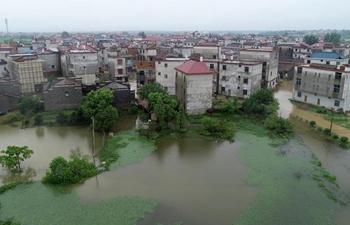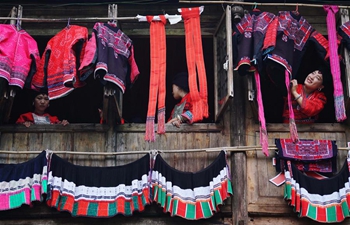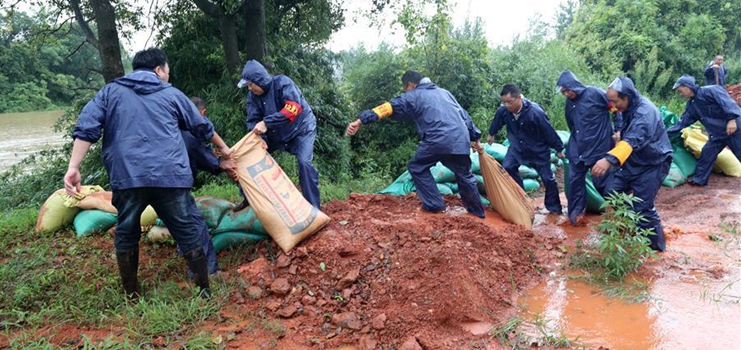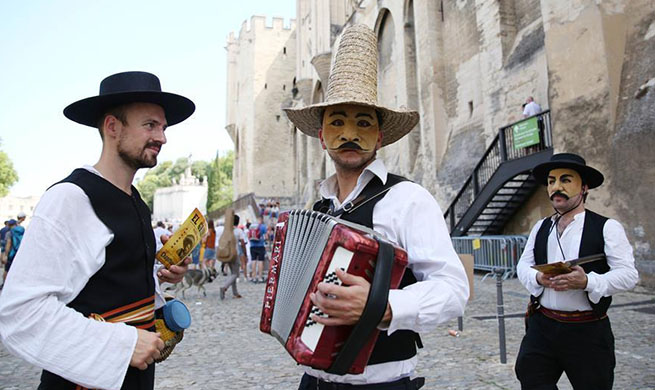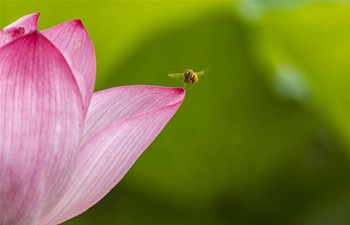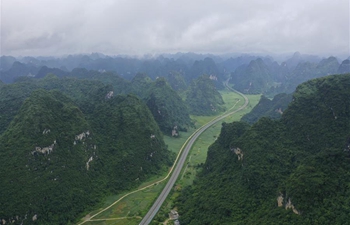by Chen Jiabao
LOEI, Thailand, July 9 (Xinhua) -- When Zhang received a travel tip of Pi Ta Khon, a unique Thai Ghost Festival in her weibo, the 28-year-old Chinese girl who can't speak Thai at all decided to explore Thailand alone once again.
She was surprised by a fantastic welcome dance at the airport when she arrived in Loei Province, about 520 km away from capital Bangkok in the Northeast of Thailand near the Lao border surrounded by misty hills.
Local people dressed in ghosts clothes made up of colorful tasseled rags, wearing wildly colorful ghost masks, were inviting visitors to join the dancing at the airport, kicking off a three-day celebration since July 5.
"It's great fun drawing visitors seeking a taste of Thainess off the country's better-known travel paths. I can't wait to join the celebrations," said Zhang, an independent traveller who has been to the Southeast Asian country for several times.
The festival involves games, concerts, and parades, with locals dancing around the streets sporting their scary mask costumes while clanging cowbells to announce the presence of the spirits.
It is said that a long time ago Prince Vessantara (Buddha in his past life) made a long journey. Indeed, he had been gone for so long that all of his followers presumed him dead. Yet, one day, he returned, alive and well. His followers rejoiced, and the celebrations were so raucous that they are said to have woken the dead.
The celebrations have continued through time, and evolved into one of the most exciting among Thailand's festivals.
"I'm glad to see that modern prudery hasn't wiped out these phallic displays in this lovely region of Loei. I'm fascinated by the distinctive culture and impressed by people's hospitality here. Shopping in the major tourism destination is no longer my cup of tea. I enjoy talking with locals, exploring the beauty of the hidden gem in the country," Zhang told Xinhua.
Enjoying the country's free visa-on arrival policy, Zhang managed to go on her "adventure" at any time. What she has to do is just to book hotel and flights online and rent a car, "an easy job" that she can manage in a cell phone at once.
She said her next stop is the ancient village Chiang Kan at the Mekong river. "I would like to see life along the river that separates people from Thailand and Laos," said the young girl.
Zhang is not the only independent traveler who is keen to less known destinations in Thailand as wanderlust among Chinese visitors deepens.
"More and more Chinese visitors came to the Tourism Authority of Thailand (TAT) to ask for travel information of festivals and celebration across Thailand, most of them individual travelers. They make detailed plans covering accommodations, transports and routes," said Thipaporn, a marketing official from the TAT.
"Young Chinese people's travel boom is also driven by the way social media is shaping human behaviour and global culture. The trend now is away from buying things and towards buying experiences - and travel is perhaps the ultimate experiential consumption," said Thipaporn in an interview with Xinhua.
According to statistics from Thailand's tourism body, Chinese tourists totaled more than 10 million in 2018, taking up about one third of the country's foreign arrivals. The 60:40 ratio of independent and group tourists over the past few years has changed to 70:30.
The new trend has changed Thailand a lot, forcing the country to equip most of the tourist attractions with facilities that can reach Chinese tourists, including online payment service and QR code for accessing introductions of tourist destinations, said Thipaporn.
"Younger generation, the technology savvy explorers, will bring tourism income to remote areas, helping the country to strike a balance of development," said the official.
She said the TAT will place greater focus on market segmentation and potential niche market groups, especially lifestyle and health-oriented individual tourists who tend to spend more during trips compared with mass tourism.





